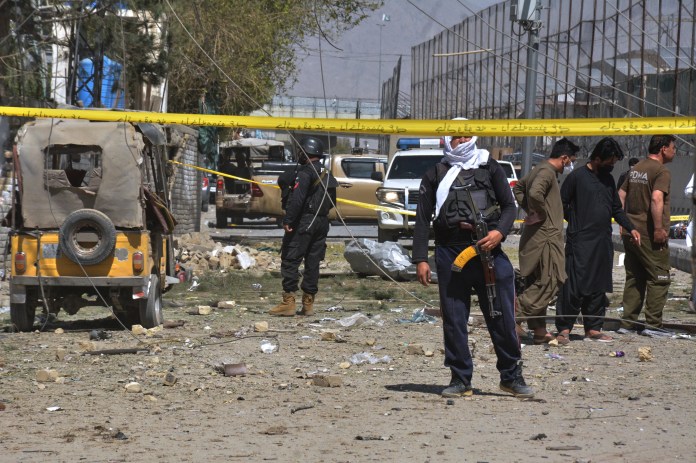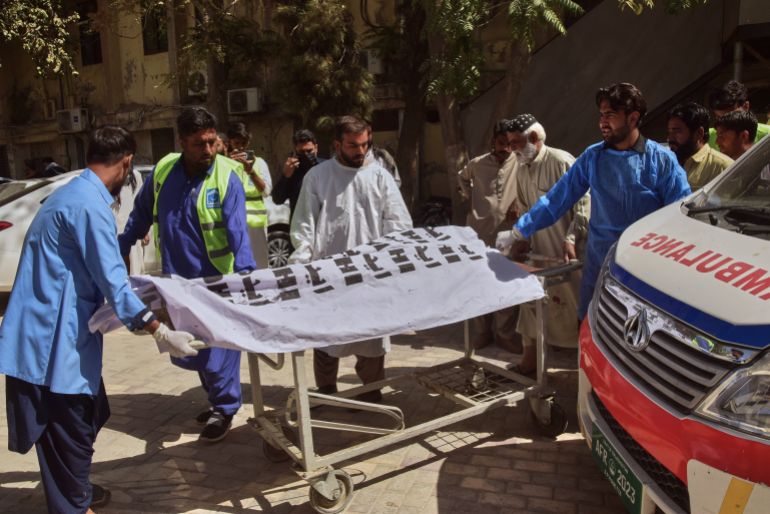Islamabad, Pakistan – A powerful car bomb blast outside the headquarters of Pakistan’s paramilitary Frontier Corps in the southwestern city of Quetta has killed at least 10 people and wounded more than 30 others, authorities said.
The explosion, swiftly followed by heavy gunfire, tore through the vicinity of Zarghoon Road in Quetta, capital of Balochistan province, on Tuesday.
Recommended Stories
list of 4 itemsend of list
“Two law enforcement personnel were killed while the rest of the dead were civilians,” Bakht Muhammad Kakar, the provincial health minister, told Al Jazeera.
A security camera video posted on social media showed a vehicle turning towards the regional headquarters of the Frontier Corps and exploding within seconds.
Naresh Kumar, a witness, said he was standing outside his office close to the targeted building when the explosion took place. “My mind just went blank. I got hit by shards of glasses in my arm and back. The explosion was just massive,” Kumar told Al Jazeera.
Inam, another injured person who only gave his first name, was brought to the hospital where he was treated for wounds after glass shards injured his back due to the explosion.
“Our office is right around the paramilitary building. We were working in our office when the explosion totally rocked us and then everything went dark. I could hear firing which lasted for a while before the law enforcement arrived to take control,” he told Al Jazeera via telephone from the hospital.
Balochistan’s Chief Minister Mir Sarfraz Bugti condemned the incident, labelling it a “terrorist attack”. Speaking after the blast, Bugti confirmed that at least four attackers were killed by the security personnel.

Pakistan’s President Asif Ali Zardari issued a strong condemnation over the attack, saying, “The misguided extremists were acting on India’s agenda.” He did not give details.
India has not yet responded to the allegation. No group has claimed responsibility for the bombing.
Balochistan’s economic significance
Balochistan is Pakistan’s largest yet most sparsely populated province. Home to about 15 million people in a country of roughly 240 million, it remains the country’s poorest province despite possessing vast reserves of oil, coal, gold, copper, and gas. While these resources contribute substantially to the revenues of the federal government, the province itself faces economic hardships.
Balochistan is also home to Gwadar, a strategic deep-sea port which is the centrepiece of $60bn China-Pakistan Economic Corridor (CPEC) project designed to establish a trade link between southwestern China and the Arabian Sea.
However, Chinese investments, particularly in Balochistan, have fuelled local resentments. Residents accuse Chinese firms of “stealing local resources” and this sentiment has repeatedly driven local armed groups to attack Chinese personnel and installations.
The province also has the Reko Diq reserves, which are said to contain the world’s fifth-largest copper deposits.
Canadian firm Barrick Mining has been operating at the site since 2022. Earlier this month, Pakistan also signed a $500m deal with a United States-based firm to export critical minerals and rare earth elements.

The local resentments have fuelled a rebellion movement for decades, which aims to establish an independent Balochistan state.
As violence escalates in the province, analysts have questioned the government’s ability in eliminating the armed and rebel groups such as the Baloch Liberation Army (BLA) or the Baloch Liberation Front (BLF).
Muhammad Arif, an expert on international relations, said the demography of Balochistan is complex for both the violent groups as well as the government as he pointed out a logistical challenge inherent in the province’s topography.
“It is not possible for non-state actors to take control of the region of Balochistan with its vast, difficult terrain, but at the same time, the security of each and every corner of the state is difficult for the same reasons,” he said.
Arif suggested that a recent surge in violence could be linked to the government’s counter-insurgency operations.
“It is believed that the Baloch Liberation Army and other groups have suffered heavy casualties in the last couple of weeks, with the Pakistani forces helped by Chinese communication equipment along with drones and Pakistani jet fighters. [Tuesday’s] attack could be a retaliation move,” the Quetta-based analyst told Al Jazeera.
Source: Aljazeera

Leave a Reply